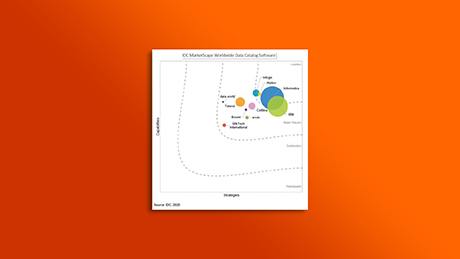Informatica a Leader in IDC’s Assessment of Data Catalog Solutions

Informatica has been named a leader in IDC’s first-ever Marketscape for Worldwide Data Catalog Software. We are delighted and honored by this assessment from IDC.
IDC views data intelligence as the future unified data platform. In the report, IDC states, “The future of intelligence is informed by data intelligence, where data-native workers and machines can synthesize information, improve their capacity to learn, and automate insights at scale.” And IDC defines data cataloging as a cornerstone of the data intelligence software market category.
We at Informatica couldn’t agree more with IDC. At Informatica, we call this new era of data management Data 4.0. Foundational to Data 4.0 is AI-powered intelligent data management – metadata-driven intelligence and automation powering all aspects of data management. And the most effective way to establish this metadata foundation across all of your data estate is through an intelligent, enterprise-scale data catalog. The investments we have made over the last few years in our next-generation data catalog, Informatica Enterprise Data Catalog (EDC), and the industry’s only metadata-driven AI engine, CLAIRE, are a testament to our belief in this vision. We are humbled by IDC’s recognition of our commitment to this vision.
6 data catalog requirements for data intelligence at enterprise scale
Hundreds of customers are advancing their digital transformation with Informatica Enterprise Data Catalog as a foundational component of their modern data architecture. The trust and confidence they have placed in us is one of the key reasons why we have been named a leader in this report. Our engagements with these customers have also given us a good perspective on what is required to execute on our vision for data intelligence at enterprise scale – a perspective that aligns well with key points highlighted in IDC’s report. Some common themes are:
- Breadth and depth of metadata connectivity across the enterprise: If metadata management is key to enabling data intelligence, then the ability to extract metadata from all types of data sources becomes a table-stakes requirement. This includes multi-cloud data warehouses and data lakes, on-premises data warehouses, BI tools, ETL tools, enterprise applications, and even third-party catalogs, delivering on our vision for a true catalog of catalogs. Informatica recently expanded its industry-leading breadth and depth of metadata connectivity with its acquisition of Compact Systems, which allows metadata extraction from the most complex data sources including static and dynamic code in databases.
- End-to-end data lineage: Data lineage is emerging as a foundational “use case” that underpins all data-driven business transformation priorities. Too often, understanding data lineage is a laborious manual process and has too many black boxes. IDC states, “Informatica has broad metadata connectivity and deep extraction capabilities to provide end-to-end lineage, even for data not flowing through the Informatica platform.” This allows Informatica Enterprise Data Catalog to deliver automated, detailed, end-to-end lineage with no black boxes to automate data governance and regulatory compliance.
- AI/ML-powered automation: As IDC states in the report, “CLAIRE is Informatica's AI engine learning from metadata to automate data discovery and classification and make recommendations during data curation.” In Enterprise Data Catalog, CLAIRE-powered automated data discovery enables tagging and classification of data based on discovery of domains and entities, automated association of business and technical domains, and automated data similarity and relationship discovery. This level of automation is critical to executing on IDC’s vision of data intelligence with automated insights at scale.
- Collaboration and crowd-sourced curation: Collaboration capabilities in Enterprise Data Catalog allow customers to tap into shared data knowledge across the enterprise. Crowd-sourced data curation in the form of custom tags, ratings, reviews, etc. is also indexed and leveraged to provide better search results and more context for data consumers, allowing customers to harness the best of AI and human expertise.
- Support for all business use cases: As enterprises embark on their digital transformation journey, they are looking for data catalogs with the agility and extensibility to support all business use cases – from data governance and privacy to self-service analytics, cloud modernization, and customer 360. As IDC states in the report, “Informatica's data governance, data quality, data integration, and master data management capabilities often accompany data catalog procurement, illustrating that data cataloging is only a part of an overall data intelligence strategy and what Informatica can bring to the table through its broader platform offerings.”
- Massive enterprise scale: The growth in scale and complexity of the modern data environment shows no signs of slowing down, especially with the rapid adoption of cloud-scale data architectures. Enterprises are rapidly moving from department-level projects to enterprise-wide data cataloging and metadata management. It’s no surprise that we are seeing many enterprise-scale deployments with over 100 million data assets across multi-cloud and on-premises scanned and cataloged by Enterprise Data Catalog.
In alignment with these themes we are seeing in the market, IDC advises customers to “consider Informatica when you are an enterprise or midmarket organization with a diverse, distributed, and large-scale data estate in which automated data intelligence harvesting, classification, and curation demand an automated approach to modernize your data infrastructure for enablement of data-driven business priorities.”
Enterprise Data Catalog customers share their testimonials
Our customer deployments stand as a testament to our ability to deliver on this promise. We are grateful that many of them have provided public testimonials about their data-driven transformations enabled by Informatica Enterprise Data Catalog.
Both Anthem and athenahealth spoke about their digital transformation initiatives in the recently concluded CLAIREview series of Intelligent Data Summits. Anthem, a leading health insurance provider, discussed how Enterprise Data Catalog has helped establish a common metadata repository for enterprise data governance, while enabling automation that is saving them millions of dollars annually through improved efficiencies in data discovery and data literacy. And athenahealth is accelerating cloud data warehouse modernization with Snowflake by leveraging Enterprise Data Catalog along with Informatica Intelligent Cloud Services (IICS), Informatica Axon Data Governance and Informatica Data Quality to govern and deliver trusted data across the entire data lifecycle.
In financial services, Rabobank, the second largest bank in the Netherlands, is strengthening its regulatory compliance for BCBS 239 and enabling more efficient data governance by using Enterprise Data Catalog for automated end-to-end lineage. Invesco, a leading financial services provider that spoke at our MDM 360 and Data Governance Summit, is democratizing trusted data for self-service analytics on an AWS cloud data lake with Informatica’s intelligent data governance solution powered by Enterprise Data Catalog and Axon Data Governance.
To learn more about IDC’s perspective on the data catalog market and why they named Informatica a leader, download the report. For more on Informatica’s vision of a catalog of catalogs, read this eBook, “Drive Your Business Forward with a Catalog of Catalogs.”
IDC MarketScape vendor analysis model is designed to provide an overview of the competitive fitness of ICT suppliers in a given market. The research methodology utilizes a rigorous scoring methodology based on both qualitative and quantitative criteria that results in a single graphical illustration of each vendor’s position within a given market. The Capabilities score measures vendor product, go-to-market and business execution in the short-term. The Strategy score measures alignment of vendor strategies with customer requirements in a 3-5-year timeframe. Vendor market share is represented by the size of the icons.








